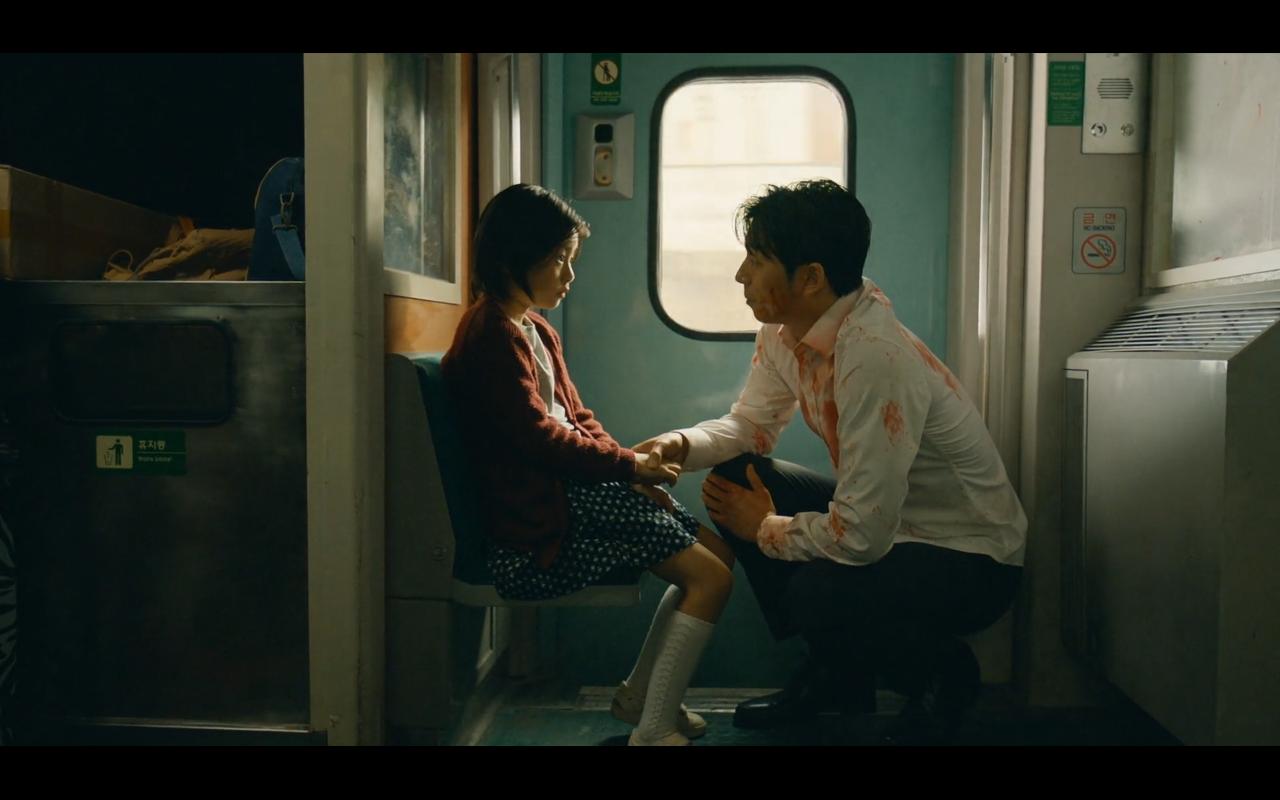Train to Busan (2016)

Review of Train to Busan (2016)
South Korean director Yeon Sang-ho’s Train to Busan (2016) is a heart-pounding blend of action, horror, and human drama. Set against the backdrop of a zombie apocalypse, this film transcends its genre conventions to deliver a story that is as emotionally resonant as it is thrilling. With its dynamic characters, razor-sharp social commentary, and unrelenting pace, Train to Busan is a standout in modern zombie cinema and a testament to the power of well-crafted storytelling.
Plot Overview
The film begins with Seok-woo (Gong Yoo), a workaholic fund manager, reluctantly accompanying his young daughter, Su-an (Kim Su-an), on a train ride from Seoul to Busan to visit her mother. Their strained relationship sets the emotional tone of the story. However, the journey takes a horrifying turn when a mysterious outbreak transforms passengers into ravenous zombies, turning the high-speed train into a claustrophobic battleground.
As Seok-woo, Su-an, and a group of survivors fight for their lives, the film explores themes of sacrifice, humanity, and the moral dilemmas that arise in the face of survival. With each passing station, the stakes escalate, culminating in a nail-biting finale that leaves a lasting emotional impact.
Themes and Social Commentary
1. Sacrifice and Selflessness
At its core, Train to Busan is a story about the transformative power of sacrifice and selflessness. Seok-woo begins the film as a self-centered man, prioritizing his career over his daughter. However, the apocalypse forces him to confront his shortcomings and rediscover his humanity. This theme is mirrored in other characters, such as Sang-hwa (Ma Dong-seok), a burly but kind-hearted man who becomes one of the film’s most heroic figures.
The film’s exploration of sacrifice reaches its emotional peak in its final act, where acts of selflessness take center stage. These moments underscore the idea that true heroism lies not in physical strength but in the willingness to put others before oneself.
2. Social Class and Inequality
Train to Busan offers sharp commentary on societal divisions and the dehumanizing effects of capitalism. Seok-woo’s initial cynicism and the actions of other selfish characters, such as the manipulative COO Yon-suk (Kim Eui-sung), highlight the moral decay that can result from placing profit and self-interest above human lives. The stark contrast between these characters and those who band together to protect each other emphasizes the value of empathy and community.
The film also critiques social hierarchies, as the train becomes a microcosm of society. The desperation and chaos among passengers reflect how fear and inequality can fracture communities, turning people against one another in times of crisis.
3. Parenthood and Legacy
The relationship between Seok-woo and Su-an serves as the emotional anchor of the film. Their journey symbolizes the challenges and responsibilities of parenthood, as Seok-woo learns to prioritize his daughter’s well-being over his own ambitions. Su-an’s innocence and unwavering moral compass contrast with the chaos around her, reminding the audience of the importance of hope and integrity in a broken world.
Performances and Characterization
The cast of Train to Busan delivers stellar performances, bringing depth and humanity to their roles. Gong Yoo’s portrayal of Seok-woo captures the character’s evolution from a detached father to a selfless protector. His chemistry with Kim Su-an, who delivers a remarkable performance as Su-an, adds emotional weight to the story.
Ma Dong-seok’s Sang-hwa is a standout character, combining humor, strength, and vulnerability. His dynamic with his pregnant wife, Seong-kyeong (Jung Yu-mi), provides moments of levity and tenderness amid the chaos. Kim Eui-sung’s portrayal of Yon-suk is equally compelling, embodying the worst aspects of human nature without becoming a caricature.
Each character—from the teenage couple Young-gook (Choi Woo-shik) and Jin-hee (Ahn So-hee) to the elderly sisters In-gil (Ye Soo-jung) and Jong-gil (Park Myung-shin)—adds depth to the narrative, creating a rich tapestry of human experiences.
Action and Pacing
Train to Busan is a masterclass in pacing, balancing intense action sequences with quieter moments of character development. The confined setting of the train amplifies the tension, as the survivors have limited options for escape. Yeon Sang-ho’s direction keeps the audience on edge, utilizing tight spaces and shifting dynamics to create a sense of claustrophobic dread.
The zombie action is visceral and relentless, with the infected portrayed as fast, feral, and terrifyingly unpredictable. The film’s use of practical effects and dynamic choreography makes the action feel grounded and immediate, enhancing the stakes.
Cinematography and Visuals
The film’s cinematography, helmed by Lee Hyung-deok, captures both the chaos of the outbreak and the emotional beats of the story. The visuals are striking, from the dimly lit train compartments to the apocalyptic landscapes glimpsed through the windows. The contrast between the kinetic zombie sequences and the still, poignant moments of reflection creates a powerful visual rhythm.
The design of the zombies themselves is another highlight, with their jerky movements and grotesque transformations adding to the film’s sense of horror. The makeup and effects team deserve praise for their work in bringing the infected to life.
Emotional Impact
What sets Train to Busan apart from other zombie films is its emotional resonance. The film’s characters feel real and relatable, making their struggles and sacrifices all the more impactful. By the end of the film, audiences are left not only exhilarated but deeply moved, reflecting on the human capacity for love, resilience, and redemption.
Conclusion
Train to Busan is a tour de force that transcends its genre to deliver a story that is equal parts thrilling and heartfelt. Yeon Sang-ho’s expert direction, combined with outstanding performances, sharp social commentary, and breathtaking action, makes this film a modern classic. It is a must-watch for fans of horror, action, and emotionally driven storytelling.
Whether you come for the zombies or stay for the characters, Train to Busan will leave you breathless and profoundly moved. It is not just a film about survival but a powerful reminder of what it means to be human in the face of unimaginable adversity.